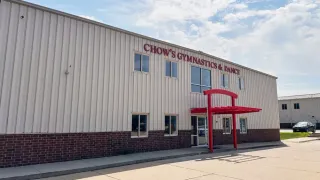February 19, 2021
Doctors Race to Find, Vaccinate Vulnerable Homebound People
Tom Murphy READ TIME: 4 MIN.
A group of health care workers hurried out of a Boston hospital on a recent weekday morning, clutching small red coolers filled with COVID-19 vaccines.
Their challenge: Beat traffic, a looming snowstorm and the clock. They had to get shots in the arms of their homebound patients before the vaccines expired in a few hours.
"That clock is in the back of my mind the whole time," said Dr. Won Lee, a home care specialist at Boston Medical Center.
Millions of U.S. residents will need COVID-19 vaccines brought to them because they rarely or never leave home. Doctors and nurses who specialize in home care are leading this push and starting to get help from state and local governments around the country.
But they face several challenges. Researchers say many homebound people don't receive regular medical care, which makes it hard to identify everyone who needs a vaccine.
Supplies also are limited, and both the Pfizer and Moderna vaccines expire a few hours after syringes pull the vaccine from vials.
That makes it tough for one doctor to see many patients when they must also stay in someone's home for at least 15 minutes after the shot in case an allergic reaction develops.
"They don't live next door to each other," said Dr. David Moen of Prospero Health Partners, which delivers care to patients in several states. "It's challenging to go to multiple locations."
Even so, health care providers report progress. Lee figures she can deliver five or six doses during an average day. That will be her main focus the next several weeks.
One of her recent stops was at the second-floor apartment of a regular patient, 106-year-old Domingas Pina, who hasn't left home in about a year.
Lee sat with Pina at her dining room table, swabbed the patient's shoulder and then swiftly administered the shot as Pina looked away.
The patient then smiled beneath her surgical mask and flashed a thumbs up. Pina, who speaks mostly Portuguese Creole, will get her second dose of the vaccine next month, right around her 107th birthday.
"She misses all her grandchildren and her friends that used to come all the time," daughter Maria Lopes said. "We don't want to lose her."
After giving Pina the shot, Lee asked how she was doing and about her blood pressure medication. She then slipped off Pina's Darth Vader slippers to exam her feet.
Before long, the doctor had left for her next patient.
Lee's office sets up the appointments and explains the vaccine in advance. That helps the visit go smoothly, and Lee tries to see patients who live near each other to conserve time.
She also tells them she can't stay too long after the shots "because I have to make sure I get these vaccines to all the patients that need them today."
Dr. Karen Abrashkin hopes to take a similar approach. She will use mapping software to plan stops among clusters of patients who live near each other in the New York City area.
But the director of Northwell Health's House Calls program is still waiting for the vaccine.
"We get many questions each day about when we're going to have vaccines to give in the home," she said. "The supply just isn't there yet."
One of her patients, 103-year-old Ida Sobel, has no plans to leave her apartment building until she gets vaccinated.
While she waits, Sobel, who is legally blind and lives with a home health aide, has food delivered. She walks the hallway outside her front door for exercise and opens a window when she wants fresh air.
"I am in a very crowded area," the Floral Park, New York, resident said. "People are not conscious enough to avoid you and stay far away, so I avoid them."
Harvard Medical School professor Dr. Christine Ritchie estimates that about 2 million U.S. residents are homebound. Another 5 million have trouble leaving home or need help doing so. Many of them may need vaccines brought to them as well.
This population generally includes older people with lower-than-average income levels and serious medical problems like dementia, advanced heart conditions or arthritis.
Ritchie noted that homebound people draw less attention from public health officials than those who live in group settings like nursing homes, which are receiving vaccines from major drugstore chains.
Homebound people, Ritchie said, "tend to be sort of invisible to society."
On Staten Island, James De Silva has grown frustrated because he has no good vaccine options for his 96-year-old mother, but people much younger than her can get shots if they leave home. Mary Stella De Silva is mostly bedbound and receives around-the-clock home care.
That care doesn't include the vaccine, and De Silva will need to arrange an ambulance or special transportation to take her to an appointment, if he lands one.
"I think the homebound should be given a little bit more priority than someone who is just 65 and might not have an underlying illness," he said. "It's not being given the attention it deserves, frankly."
That appears to be changing. Fire departments around the country have started delivering vaccines.
In the Gulf Coast city of Corpus Christi, Texas, the fire department has used a list of Meals on Wheels recipients to deliver more than 2,000 doses of the Moderna vaccine since late January. Chief Robert Rocha said they've also set up a hotline for anyone who still needs a vaccination.
Last week, New York City Mayor Bill DeBlasio said his city would start sending medical personnel to the apartments of homebound people as soon as a one-shot vaccine made by Johnson & Johnson is available. Federal regulators may approve that vaccine in a few weeks.
Deliveries like that can't start soon enough for De Silva and his mother.
"If she was in a nursing home or a long-term care facility, she would have been vaccinated by now," he said. "She's really in the same situation, but she's at home."
___
Associated Press video journalist Rodrique Ngowi contributed to this report.






